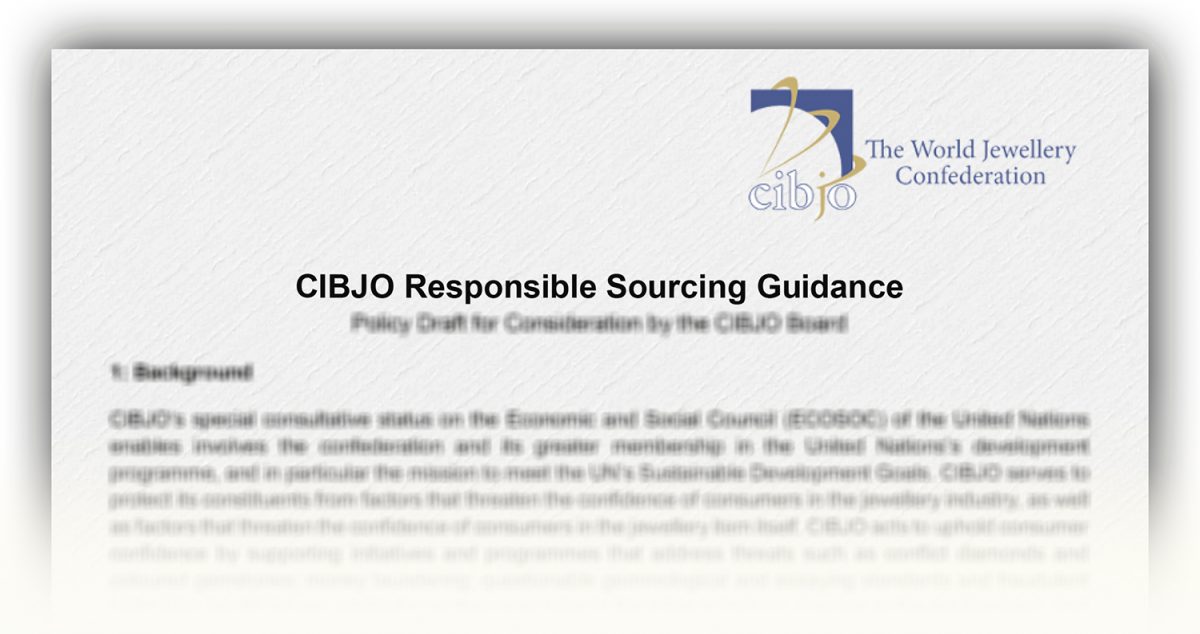CIBJO sets up industry-wide working committee to formulate Responsible Sourcing Guidance for gem and jewellery sectors

MAY 8, 2018
CIBJO, the World Jewellery Confederation, has announced the establishment of an industry-wide working committee, which will be charged with formulating Responsible Sourcing Guidelines specifically for the jewellery, gem and precious metals sectors. The new body was created by a decision of the CIBJO Board of Directors in March 2018, following Board approval of a draft Responsible Sourcing Guidelines document.
The guidelines, which when ratified will have the status of a CIBJO Blue Book, are intended to provide a general framework for responsible sourcing practices, serving as a roadmap for all industry participants. The guidelines will be voluntary recommendations for members of the sector, and will not constitute a standard or compliance mechanism by CIBJO. This means that members of the industry who would like certification or any other formal recognition of their implementation of responsible sourcing policies will need to do so through an internationally recognised standards organisation, such as the Responsible Jewellery Council (RJC).
The proposed CIBJO Responsible Sourcing Guidance will follow the Organisation for Economic Cooperation and Development’s (OECD) Due Diligence Guidance for Responsible Supply Chains of Minerals from Conflict-Affected and High-Risk Areas, and also supports the United Nations Guiding Principles on Business and Human Rights.
The Responsible Sourcing Committee, which is chaired by CIBJO President Gaetano Cavalieri, includes senior CIBJO officials from various industry sectors, as well as representatives of other industry organisations, including the RJC, with which CIBJO has a Memorandum of Understanding. The core Guidance document, which was approved by the CIBJO board in March 2018, was prepared by Philip Olden, a former managing director at the World Gold Council, who is an expert on responsible sourcing strategies in the precious metals and jewellery sector, and consults with major industry bodies in formulating their own responsible sourcing policies.
“Our objective is to formulate harmonised industry guidance as to what constitutes responsible sourcing and how it should be approached,” said Dr. Cavalieri. “Because we work in a business in which the supply chain almost always comprises multiple players, it is essential that we operate according to the same principles. Moreover, we strongly believe that all participants in the industry, small and large, should be able to demonstrate the integrity in their supply chain to the best of their ability, and the element of inclusiveness will lie at the heart of this document.”
“We are pleased to support this important project,” said Andrew Bone, Executive Director of the RJC. “Responsible sourcing is something that is already undertaken by many jewellery companies and the CIBJO Guidelines will outline the management processes for doing so in a consistent way. We are committed to working with CIBJO in promoting good practices to all members of the industry and will provide the means for companies to certify and assure their responsible sourcing practices through the RJC Code of Practices.”
When the Responsible Sourcing Committee completes the drafting of the Responsible Sourcing Guidelines document, it will be made available for both peer and public review. The final draft will be submitted for ratification as an official Blue Book at the 2018 CIBJO Congress later this year, where it is envisioned that the working committee will be transformed into a CIBJO Commission, which will be charged with reviewing and updating the document on a regular basis.
